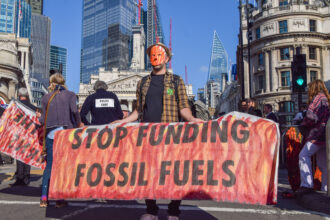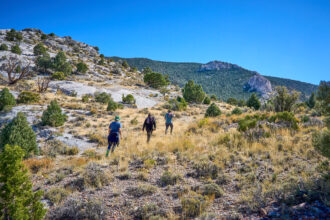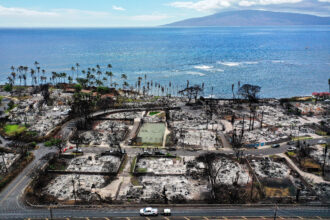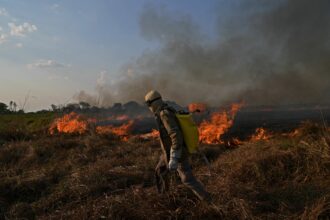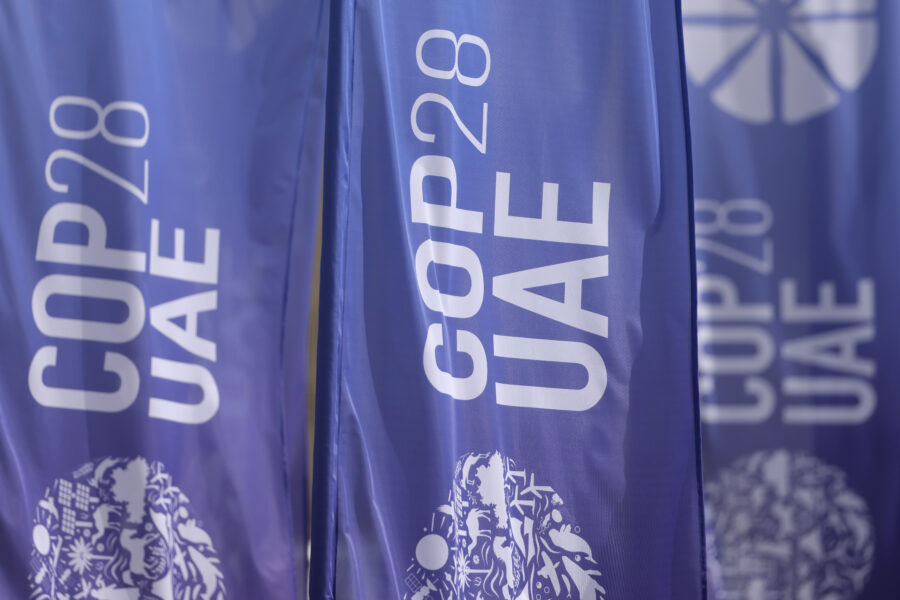From the Gulf South to Canada, frontline communities are getting hit hard by fossil fuel projects supported by a powerful firm in a notoriously opaque sector of the financial industry.
One of the largest private equity firms in the world, Kohlberg Kravis Roberts & Co. (KKR) publicly said in a 2022 sustainability report that it is committed to environmentally responsible investing and supporting decarbonization.
But a report published Thursday as part of the Private Equity Climate Risks project—an initiative investigating private equity’s impact on the climate crisis—calls the firm out for empty promises and continued harm to marginalized communities.
The report focuses on three fossil fuel projects that KKR is heavily financially involved in: the Coastal GasLink pipeline in Canada, the Port Arthur Liquified Natural Gas (LNG) project in Texas, and the Cameron LNG project in Louisiana. These projects exemplify environmental racism and are actively harming low-income, Black, brown, and Indigenous people, the report says.
“Up to the present, these environmental violations and conflicts with community members have been occurring mostly in the dark,” said Alyssa Moore, co-author of the report and a researcher for the clean energy focused data organization, Global Energy Monitor.
Moore added that increased awareness of the tangible risks of these types of investments could help demand much needed change and transparency from the private equity industry.
Thursday’s report builds on a Private Equity Climate Risks report from 2022 that detailed how a relative lack of regulatory oversight on private equity has made it easier for the industry to funnel billions of dollars into fossil fuel companies without much public scrutiny.
Private equity firms operate by using money from investors—sometimes wealthy individuals, often institutional investors like large endowments or pension funds—to create funds that can then purchase assets, like companies. Private equity firms, including KKR, have been criticized for prioritizing quick profit returns over long-term sustainability for portfolio companies, sometimes even leading to company bankruptcy—companies bought by private equity firms can be 10 times more likely to go bankrupt than other companies.
Due to a lack of regulation and limited requirements for disclosure, private equity firms are less scrutinized and more opaque than other financial actors. They’re also heavily—and quietly—invested in the oil and gas industry, even while the endowment or pension funds that give them money claim commitments to climate action or decarbonization.
“This is not something people talk about when they talk about fossil fuel financing,” said Oscar Valdés-Viera, research manager at the financial ethics coalition, Americans for Financial Reform, and co-author of the report. “We are trying to uncover that role [of private equity], and bring it to the attention of regulators and policymakers.”
Private Equity Climate Risks’ 2022 report graded the world’s eight largest private equity firms on climate impact and gave KKR a D, placing it third-to-worst. Despite KKR’s stated commitment to a renewable energy transition, Private Equity Climate Risks found that 78 percent of the companies in its energy portfolio are invested in fossil fuels. This report is part of a larger campaign calling for accountability from KKR and other private equity firms.
“KKR’s fossil fuel investments…cast doubt on the firm’s actual commitments to global climate goals, corporate responsibility, financially sound investment philosophy, and sustainability practices,” Thursday’s report reads.
KKR declined a request for comment. “We will be declining to comment on this but appreciate the opportunity to do so,” said a spokesperson, who provided a copy of the firm’s sustainability document.
Communities Push Back
The Coastal GasLink pipeline and the Cameron and Port Arthur LNG projects are among the fossil fuel projects that KKR is financing, and all three have faced significant opposition from impacted communities.
In 2019, KKR acquired a majority stake in the Coastal GasLink pipeline, along with the Alberta Investment Management Corporation. Coastal GasLink, whose pipeline runs through what is now called British Columbia, claims that it acquired “Indigenous, landowner, and stakeholder input,” on the pipeline’s route. But although the company has secured agreements with some Indigenous nations along the pipeline corridor, the Wet’suwet’en Nation has strongly opposed the pipeline’s construction on their land since the beginning.
Chief Na’Moks, hereditary chief of the Wet’suwet’en Nation, said that Coastal GasLink and KKR’s attempts to make the project seem socially responsible demonstrate corporate greenwashing—an attempt to mislead the public to think environmentally detrimental actions are environmentally friendly.
“They spent a lot of money hiding the truth,” Chief Na’Moks said in an interview with Inside Climate News. “That greenwashing that they’re doing costs them a lot of money, but if they don’t do it, they’re worried about losing their investment.”
Keep Environmental Journalism Alive
ICN provides award-winning climate coverage free of charge and advertising. We rely on donations from readers like you to keep going.
Donate NowThe 416-mile pipeline could deliver up to five billion cubic feet of gas per day, and cuts through wetlands, creeklands and crucial waters. Chief Na’Moks said the pipeline, which is in clear violation of Wet’suwet’en law, will threaten Wet’suwet’en food and freshwater sources, including a recently revitalized stock of salmon. The pipeline will also contribute to rising carbon emissions and hinder Canada’s federal targets for wildlife conservation and emission reductions.
The Wet’suwet’en land defenders’ resistance has garnered international attention, with powerful actors like the United Nations (U.N.) Committee on the Elimination of Racial Discrimination and Amnesty International Canada condemning Coastal GasLink and the Canadian government for violating the Wet’suwet’en Nation’s right to free, prior and informed consent for construction projects on their land, as required by the U.N. Declaration on the Rights of Indigenous Peoples, as well as for intimidating, harassing, and criminalizing land defenders for peaceful demonstrations.
The retaliation on Wet’suwet’en land defenders from the Royal Canadian Mounted Police was extreme, with officers dressed in tactical gear breaking down doors and physically intimidating and arbitrarily detaining community members.
“I don’t think the public realizes how bad it is,” Chief Na’Moks said. “[The officers] are the ones that are coming to our villages [and] burning down our cabins and smashing heavy equipment [and] arresting our people, and we’ve never done anything to be arrested for.”
Private Equity Climate Risks’ report emphasizes that KKR announced its investment in Coastal GasLink two weeks after the U.N. Committee on the Elimination of Racial Discrimination called for the Canadian government to “immediately halt” construction and suspend all permits on the project. Throughout the pipeline’s construction, Coastal GasLink has received numerous warnings and fines for violating environmental regulations
Environmental Racism in the Gulf South
In the Gulf of Mexico, the impacts of KKR’s fossil fuel financing are just as clear. Both Cameron Parish, Louisiana, and Port Arthur, Texas, are environmental justice communities, where Black and brown residents are dealing with elevated levels of pollution and toxicity.
Roishetta Ozane understands this well. Originally from the Mississippi Delta, Ozane has now lived in Southwest Louisiana for over 20 years. She lives close to the Texas-Louisiana border, just a few miles away from Cameron LNG, and 45 minutes from Port Arthur LNG in Texas. There are also two other LNG facilities and over 12 petrochemical facilities in her community, she said.
According to a report from ProPublica, the industrial cancer risk in Port Arthur peaks at 1 in 53, or 190 times the level of risk the Environmental Protection Agency (EPA) has deemed “acceptable.” The town is also in the 99th percentile of toxic releases to air in the country.
“Right now we need people to be focused on what’s happening here, [and] save our communities,” Ozane said. “We are not a sacrifice zone…enough is enough.”
Ozane, who’s the Gulf Fossil Finance Coordinator for Texas Campaign for the Environment and founder of the Louisiana-based mutual-aid organization, The Vessel Project, has six children, ranging in age from five to 20. She said they are acutely aware of the injustices facing their community: Her 11-year-old daughter has asthma and a painful, environmentally caused skin condition, and has spoken out about how the concentration of toxic facilities in her neighborhood has impacted her health.
Outlining the risks of increased methane emissions from the LNG plants, Ozane noted that rising emissions may lead to intensified hurricanes. Meanwhile, the LNG facilities are being built on wetlands, which act as natural storm protection in the region. Without wetlands, and facing harsher storms, communities that have already suffered from natural disasters will be at even greater risk.
“They’re harming our communities, and they don’t have to live here and deal with the impacts of what they’re paying for,” said Ozane, who lost her own home to Hurricanes Laura and Delta in 2020 and had to live with her children in a Federal Emergency Management Agency trailer for two years.
Cameron LNG has repeatedly received enforcement actions and compliance orders from the EPA for violating environmental regulations, including the Clean Water Act, the Clean Air Act, and the Resource Conservation and Recovery Act, the report says. It also sits in a zone with severe flood risk.
In addition to posing health and safety risks for nearby residents, these projects also pose financial risks to KKR’s investors, including pension funds, the report says. The report calls KKR to commit to ceasing new fossil fuel investments and disclosing all current fossil fuel investments, emissions and impacts, including environmental violations. It also calls for KKR to disclose a portfolio-wide climate transition plan, to specifically address community harms from its fossil fuel investments and to provide transparency on political spending and climate-related lobbying.
Ozane said that she sees potential for firms like KKR to be part of the solution, if they would only take action.
“There is a good opportunity [for] KKR and other private equity firms [to] actually help the communities that they’re harming,” she said, calling for investments in renewable energy solutions, green spaces and green infrastructure development within communities like hers. “There are so many things that those firms can invest in to help that community as opposed to putting all of those billion[s of] dollars in an industry that doesn’t care about their community at all.”








